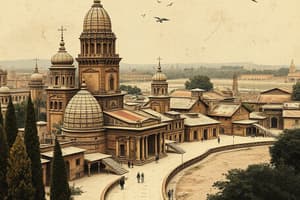Podcast
Questions and Answers
What is the primary goal of urban design in town planning?
What is the primary goal of urban design in town planning?
- To maximize economic growth
- To enhance the quality of life for citizens (correct)
- To create visually appealing buildings
- To reduce urban sprawl
Urban design involves the design of buildings, spaces, and infrastructure.
Urban design involves the design of buildings, spaces, and infrastructure.
True (A)
What is the benefit of mixed-use development in urban design?
What is the benefit of mixed-use development in urban design?
Combining residential, commercial, and recreational activities in close proximity
Urban design involves the allocation of land for various activities, such as _______________, employment, and recreation.
Urban design involves the allocation of land for various activities, such as _______________, employment, and recreation.
What is the primary benefit of walkability in urban design?
What is the primary benefit of walkability in urban design?
Urban design promotes social cohesion among citizens.
Urban design promotes social cohesion among citizens.
Match the following urban design elements with their descriptions:
Match the following urban design elements with their descriptions:
What is the benefit of urban design in terms of environmental sustainability?
What is the benefit of urban design in terms of environmental sustainability?
Study Notes
Urban Design in Town Planning
Definition
- Urban design is the process of shaping the physical environment of cities and towns to enhance the quality of life for citizens
- It involves the design of buildings, spaces, and infrastructure to create vibrant, sustainable, and livable communities
Principles of Urban Design
- Mixed-use development: combining residential, commercial, and recreational activities in close proximity
- Walkability: designing streets and public spaces that prioritize pedestrian access and safety
- Density: creating compact, efficient, and livable urban environments
- Diversity: incorporating a range of housing types, activities, and land uses to foster community diversity
- Accessibility: ensuring equal access to urban amenities and opportunities for all citizens
Urban Design Elements
- Streets: designing streets as public spaces that balance mobility, safety, and community interaction
- Public spaces: creating vibrant parks, plazas, and squares that foster social interaction and community engagement
- Building design: designing buildings that respond to their context, respect local character, and promote urban vitality
- Land use: allocating land for various activities, such as housing, employment, and recreation, to create a balanced and sustainable urban environment
Benefits of Urban Design
- Enhanced quality of life: creating livable, sustainable, and inclusive urban environments that promote citizen well-being
- Economic growth: attracting businesses, investment, and talent through vibrant, well-designed urban spaces
- Environmental sustainability: reducing urban sprawl, promoting alternative transportation, and conserving natural resources
- Social cohesion: fostering community engagement, social interaction, and a sense of place among citizens
Urban Design in Town Planning
Definition
- Urban design shapes the physical environment of cities and towns to enhance citizens' quality of life.
- It involves designing buildings, spaces, and infrastructure to create vibrant, sustainable, and livable communities.
Principles of Urban Design
Characteristics of Urban Design
- Mixed-use development combines residential, commercial, and recreational activities in close proximity.
- Walkability prioritizes pedestrian access and safety in street design.
- Density creates compact, efficient, and livable urban environments.
- Diversity incorporates a range of housing types, activities, and land uses to foster community diversity.
- Accessibility ensures equal access to urban amenities and opportunities for all citizens.
Urban Design Elements
Components of Urban Design
- Streets are designed as public spaces that balance mobility, safety, and community interaction.
- Public spaces include vibrant parks, plazas, and squares that foster social interaction and community engagement.
- Building design responds to context, respects local character, and promotes urban vitality.
- Land use allocates land for various activities, such as housing, employment, and recreation, to create a balanced and sustainable urban environment.
Benefits of Urban Design
Outcomes of Urban Design
- Urban design enhances quality of life by creating livable, sustainable, and inclusive urban environments.
- It promotes economic growth by attracting businesses, investment, and talent through vibrant, well-designed urban spaces.
- Urban design supports environmental sustainability by reducing urban sprawl, promoting alternative transportation, and conserving natural resources.
- It fosters social cohesion by encouraging community engagement, social interaction, and a sense of place among citizens.
Studying That Suits You
Use AI to generate personalized quizzes and flashcards to suit your learning preferences.
Description
Learn about the principles of urban design, including mixed-use development and walkability, to create sustainable and livable communities.




